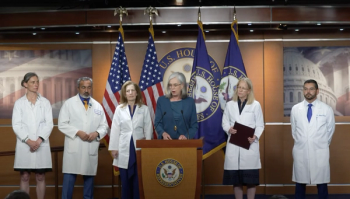
Long-term exposure to water contaminants, even below the regulatory limits, significantly increases the risk of chronic kidney disease.

Long-term exposure to water contaminants, even below the regulatory limits, significantly increases the risk of chronic kidney disease.

New research reveals critical gaps in treatment for advanced non–small cell lung cancer (NSCLC), emphasizing the need for innovative therapies to improve patient outcomes.

Secondary analysis findings from the EMPACT-MI trial highlight empagliflozin's significant cardiovascular and kidney benefits when initiated soon after an acute myocardial infarction.

Medical societies challenge HHS Secretary Robert F. Kennedy Jr's COVID-19 vaccine rollbacks, and more news updates from the week.

Explore how health equity initiatives aim to improve health care access and reduce disparities in mental health and opioid treatment.

Explore how the Collaborative Care Model enhances mental health access in this episode featuring Anna Bobb, MPH, executive director of the Path Forward coalition.

Rachel Rohaidy, MD, of Miami Neuroscience Institute and Baptist Health, discusses how the evolving treatment landscape is reducing stigma around relapse and why ongoing recovery requires daily commitment.

From the impact of rising grocery prices to disparities in myeloma outcomes, check out news from the Center on Health Equity & Access this past week.

FDA issues a complete response letter for oxylanthanum carbonate, a treatment for hyperphosphatemia in patients with chronic kidney disease (CKD) on dialysis.

Smartphone-based home screening significantly boosts chronic kidney disease (CKD) diagnosis and follow-up care, enhancing patient engagement and treatment outcomes.

CK Wang, MD, chief medical officer of COTA, discusses how real-world data help identify disparities and gaps in cancer care.

As Obergefell v Hodges turns 10 years, LGBTQ+ rights face renewed threats amid political shifts, impacting health care equity and access.

Explore how the Specialty Medical Home model transforms care for patients with inflammatory bowel disease (IBD) by integrating mental health support and addressing stigma.

From widening racial health disparities and abortion care restrictions to coverage losses, leadership gaps in addressing social needs, and worsening workforce shortages, the urgent need to improve health equity is underscored in the US.

Lorundrostat shows promise in reducing blood pressure and proteinuria in patients with hypertension and chronic kidney disease (CKD), highlighting its dual-action benefits.

It's a critical time to spotlight the dire health disparities affecting Black Americans, from premature deaths to maternal care, and the urgent need for systemic reforms.

Democratic leaders assert the Emergency Medical Treatment and Labor Act (EMTALA) remains vital for emergency care, countering confusion from recent policy changes affecting abortion rights and patient safety.

The country has seen historic reductions in uninsured rates and improvements in affordability since the implementation of the Affordable Care Act, the Commonwealth Fund scorecard shows.

A quick roundup episode of major news and health policy developments from The American Journal of Managed Care.

Explore how health equity and policy shape outcomes, revealing disparities in kidney disease, atopic dermatitis, and cancer care for vulnerable populations.

While the tax exclusion for employer-sponsored health care was not included in the House-passed reconciliation bill, it remains a revenue target for Congress, risking inclusion in the Senate's version.

The FDA approved mitomycin intravesical solution (Zusduri) for patients with recurrent low-grade intermediate risk non–muscle-invasive bladder cancer (NMIBC).

Race-free kidney function equations may underestimate risks for Black adults according to a new analysis.

HHS Secretary Robert F. Kennedy Jr has disbanded the Advisory Committee on Immunization Practices, aiming to restore trust in vaccines amid concerns over politicization and integrity.

Trump's sweeping health care overhaul faces scrutiny, risking coverage for millions while igniting bipartisan tensions over fiscal and social impacts.

The Congressional Budget Office estimates the package would add $2.4 trillion to the national deficit over a decade and leave 10.9 million more Americans without health insurance.

The proposed 2026 HHS budget slashes National Institutes of Health (NIH) funding by 40%, alarming health experts and threatening vital research and public health initiatives.

Darolutamide (Nubeqa) is granted FDA approval for metastatic castration-sensitive prostate cancer, enhancing survival and quality of life for patients.

A quick roundup episode of major health policy developments, from shifting COVID-19 vaccine guidance and scientific publishing controversies to rising cancer care costs and the impact of oncology biosimilars.

"Political directives should not prevent individuals from seeking safe and effective care that they desire and deserve," authors from the American College of Physicians (ACP) write.

259 Prospect Plains Rd, Bldg H
Cranbury, NJ 08512
© 2025 MJH Life Sciences®
All rights reserved.
